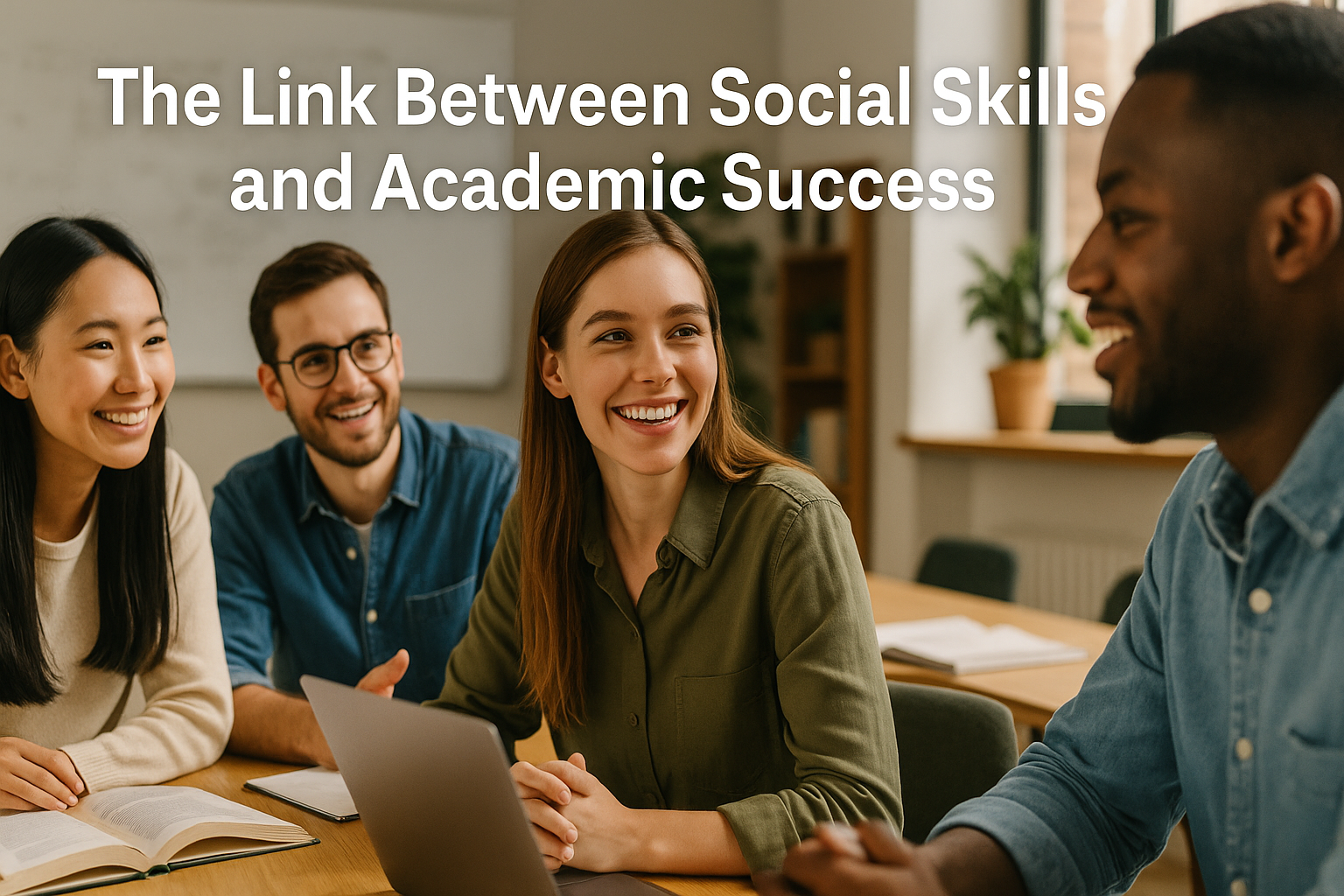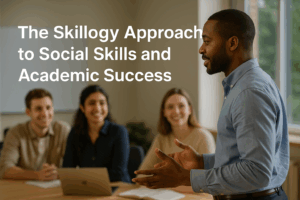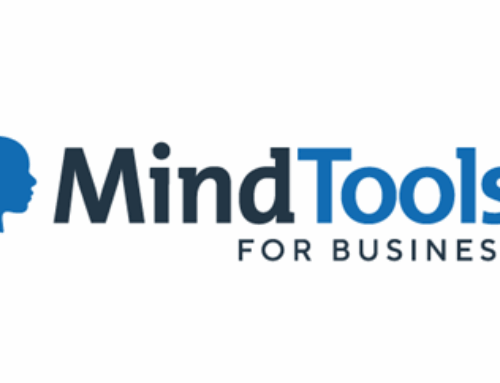Social Skills and Academic Success
Introduction
Success in education is no longer determined solely by intellect or test scores. Increasingly, it is recognised that social skills play a central role in shaping how well students engage with learning, navigate academic pressures, and prepare for future career pathways.
These skills, which involve the ability to understand and manage one’s emotions, collaborate effectively with others, and make responsible decisions, are essential for personal and professional growth.
Often discussed within the broader framework of social and emotional skills, these competencies include self-awareness, empathy, communication, adaptability, and emotional regulation.
They influence not only how students behave in the classroom, but also how they respond to challenges, build relationships with peers and educators, and develop the resilience needed to achieve long-term goals.
In both academic and workplace settings, interpersonal development and self-management skills are increasingly valued. Employers today are seeking individuals who can work well in teams, lead with empathy, and communicate effectively, traits that are fostered during a student’s formative educational years.
Therefore, equipping students with these capabilities is not just a matter of personal development, but also a strategic approach to enhancing employability and career readiness.
We explore the critical link between social skills and academic success. It will examine what these skills entail, how they manifest in educational environments, and the evidence supporting their impact on student achievement.
We will also discuss how fostering these abilities can improve future career outcomes, and what practical steps schools, student advisors, and support networks can take to nurture them in learners of all ages.
Understanding Social Skills
Before exploring how social skills contribute to academic success, it is important to understand what they encompass and how they differ from traditional markers of intelligence.
While academic performance has long been associated with cognitive ability or IQ, research increasingly shows that a student’s ability to manage emotions, interact positively with peers, and adapt to social contexts is equally, if not more, influential.
Social skills refer to the abilities that enable individuals to communicate effectively, build healthy relationships, resolve conflict, and cooperate within group settings.
These skills are foundational in shaping how students behave in the classroom, how they engage with their learning environment, and how they interpret and respond to social cues.
Within the broader category of social and emotional skills, social skills represent the outward expression of inner competencies such as empathy, self-awareness, and emotional regulation.
A student who listens attentively, communicates respectfully, and works collaboratively is demonstrating a well-developed set of these skills in action.
Closely tied to this is interpersonal development—the process by which individuals grow in their ability to relate to others. This development occurs gradually, through guided experiences, reflective practice, and real-life social interactions.
Encouraging interpersonal development in educational settings helps students build emotional maturity, trust, and an appreciation of diverse perspectives, all of which are essential for thriving in both academic and workplace environments.
Equally critical are self-management skills. These involve the regulation of emotions, behaviours, and thoughts in pursuit of personal and academic goals. Examples include managing stress during exams, staying organised with assignments, and resisting distractions in class.
Students with strong self-management skills are often more resilient, disciplined, and capable of achieving sustained academic performance.
By fostering these interconnected capabilities, educators and student support personnel are not merely teaching learners how to behave, they are equipping them with tools for lifelong success.
As we will explore in the next section, the presence of strong social skills can directly influence not only how students perform academically, but also how well they are prepared for future roles in society and the workforce.
Social Skills in the Academic Setting
In modern classrooms, social skills are no longer a soft add‑on—they are fundamental to student success. They influence not just how students interact with peers and teachers, but also how they engage with learning and manage the demands of academic life.
1. Enhancing Classroom Behaviour and Peer Relationships
Students who demonstrate strong social skills tend to:
- Communicate clearly and listen attentively
- Show respect and empathy towards classmates and teachers
- Resolve conflicts constructively
- Collaborate effectively in group tasks
Evidence shows that structured social‑emotional programmes, often termed social and emotional skills training, consistently improve student behaviour and academic engagement (socialskillscenter.com, learningpolicyinstitute.org, en.wikipedia.org).
For example, participation in evidence‑based SEL frameworks reduces behavioural issues and fosters cooperative, respectful relationships in class .
2. Role in Stress Management, Motivation and Resilience
Students with developed self‑management skills, such as emotional regulation and organisational ability, are better equipped to cope with stress, maintain motivation during complex assignments, and persevere through setbacks.
Research from the University of California highlights that learners who cultivate self-awareness and self-management skills tend to excel academically, sustain more positive relationships, and experience greater well-being (University of California, Berkeley Graduate Group in Development and Education , thesocialemotionalteacher.com).
Additionally, student wellbeing improves when teachers actively model emotional self-regulation and foster emotionally supportive classrooms.
3. Improved Study Habits Through Interpersonal Development
Good interpersonal development supports vital study behaviours: asking for help, participating in discussions, and working with peers.
Such engagement strengthens school belonging, a key predictor of attendance, persistence, and academic achievement (en.wikipedia.org).
Cooperative learning structures deliberately embed social skills development through group interdependence, accountability, and reflection, boosting both learning outcomes and peer relationships .
4. Teacher–Student Interactions
When students display respect, active listening, and conflict resolution, they enable more meaningful connections with teachers.
These positive interactions create learning environments where students feel supported, confident, and intrinsically engaged .
Summary of Research Evidence
|
Impact Area |
Key Findings |
|
Academic performance |
SEL-linked improvements of around 11 percentile points in student achievement (thesocialemotionalteacher.com) |
|
Behaviour and wellbeing |
Reduced behavioural issues, emotional distress, and anxiety |
|
Peer/collaborative learning & belonging |
Stronger interpersonal ties, class engagement, and academic resilience |
Across age groups and education systems, the evidence is unequivocal: nurturing social skills, alongside self‑management skills and interpersonal development, translates directly into academic gains and improved learner experience.
Research and Evidence – Social Skills’ Impact on Academic Performance
Robust research over the past two decades highlights the measurable impact of developing social skills, often through structured social and emotional skills (SEL) programmes, on students’ academic outcomes.
Meta‑analyses and longitudinal studies consistently demonstrate significant improvements that extend far beyond the classroom.
1. Academic Achievement Gains
A 2011 meta‑analysis of 213 school‑based SEL programmes, covering over 270,000 students from kindergarten to high school, found that participants improved their academic achievement by an average of 11 percentile points compared to non‑participants.
These gains persisted in follow‑up studies, rising to 13 percentile points in long‑term assessments (pubmed.ncbi.nlm.nih.gov, arxiv.org).
Another recent study confirmed these results, with SEL participants achieving between 11 to 17 percentile point improvements in standardised test scores (casel.org).
2. Behaviour, Engagement and Well‑being
Students in SEL programmes show:
- Enhanced prosocial behaviour and attitudes
- Reduced emotional distress, conduct issues and classroom disruption
- Higher emotional well‑being and classroom engagement (pubmed.ncbi.nlm.nih.gov, learningpolicyinstitute.org)
These behavioural and emotional improvements underpin the academic gains, creating a supportive, inclusive learning environment.
3. Resilience in Diverse Settings
Evidence confirms SEL’s effectiveness across:
- Diverse socioeconomic groups
- Kindergarten through secondary settings
- Urban, suburban and rural schools (casel.org)
Programmes facilitate interpersonal development and self‑management skills, which foster resilience and adaptability in varied contexts.
4. Cooperative Learning and Peer Influence
Programmes emphasising collaboration — a core element of social skills — show improved academic performance when:
- Students work in groups with positive interdependence
- Roles and accountability are clearly defined
- Reflection and conflict‑resolution are incorporated (arxiv.org, arxiv.org, en.wikipedia.org)
Additionally, students who are at the centre of social networks (‘central members’) often achieve higher grade point averages — underscoring the academic benefits of structured social engagement (arxiv.org).
5. Long‑Term and Holistic Outcomes
Evidence shows that SEL does not just close short‑term performance gaps—it supports sustained growth. Students exposed to SEL interventions exhibit long‑term benefits in academic performance, well‑being, and workplace readiness up to 18 years later (casel.org).
Summary
|
Outcome Area |
Research Finding |
|
Academic Growth |
11–17 percentile gains in test scores and GPA (pubmed.ncbi.nlm.nih.gov) |
|
Behaviour & Well‑being |
Fewer conduct issues, improved emotional health |
|
Diverse Contexts |
Consistent results across age, geography, and SES |
|
Peer & Cooperative Learning |
Better outcomes with structured collaboration |
|
Long‑Term Benefits |
Positive impact seen up to 18 years post‑intervention |
In summary, the evidence is compelling: investing in social skills, self‑management skills, and interpersonal development through SEL initiatives is a proven strategy to raise academic performance and well‑being in both the short and long term.
Social Skills as a Foundation for Career Success
The value of social skills extends well beyond the classroom. As students transition into the world of work, these capabilities become critical differentiators in an increasingly competitive and collaborative job market.
Employers today are not only assessing technical knowledge and academic qualifications but are placing significant emphasis on a candidate’s ability to communicate, adapt, and work effectively with others.
Social and emotional skills, which include empathy, communication, teamwork, and emotional regulation, are now considered core competencies across nearly all industries.
From healthcare to engineering, from the creative arts to finance, professionals are expected to navigate complex social environments, resolve conflicts diplomatically, and maintain composure under pressure.
One of the most immediate career benefits of strong social skills is employability. Graduates who are able to present themselves confidently in interviews, collaborate within teams, and manage workplace dynamics are more likely to secure job placements and progress in their roles.
These capabilities also enhance workplace satisfaction and longevity, contributing to more stable and fulfilling careers.
In leadership contexts, the ability to influence others, build trust, and demonstrate emotional awareness is essential.
This is where interpersonal development becomes especially relevant. Leaders with a strong foundation in interpersonal awareness and authentic communication tend to inspire higher engagement and loyalty from their teams.
Self-management skills also contribute significantly to early and sustained career success. Young professionals who can regulate their emotions, manage their time effectively, and remain self-motivated are more likely to meet deadlines, take initiative, and handle the pressures of working life with maturity.
Importantly, the groundwork for all of this is laid during a student’s educational journey. Schools and universities that invest in developing these traits are not only supporting academic excellence but are actively preparing students for a smooth and confident transition into adult life and the professional world.
In this light, social skills are not optional extras, they are career enablers. When cultivated alongside academic learning, they empower students to thrive in the workplace and adapt to the evolving demands of modern employment.
Strategies to Foster Social Skills in Students
Developing strong social skills in students requires more than occasional group work or isolated lessons in personal development.
It calls for a whole-school approach that deliberately embeds these competencies into the curriculum, classroom culture, and pastoral care systems.
When done effectively, the result is not only improved behaviour and academic performance but a generation of young people who are emotionally intelligent, resilient, and ready for the future.
1. Integrating Social Development into Curriculum and Pedagogy
Embedding social and emotional skills into everyday teaching practices is one of the most effective ways to support their development.
This may include:
- Structuring lessons to include cooperative learning tasks
- Encouraging respectful dialogue and peer feedback
- Providing reflective activities that promote self-awareness
- Linking academic content to real-life emotional or social scenarios
Incorporating these practices across subjects allows students to see the relevance of social skills in diverse contexts, from science group projects to English class debates.
2. Modelling and Mentorship by Educators
Teachers and school leaders play a vital role in shaping the emotional climate of a school. When educators model self-management skills, respectful communication, and positive conflict resolution, students are more likely to mirror these behaviours.
Establishing mentorship programmes, where older students or staff guide younger peers in their interpersonal development, can further reinforce these behaviours through consistent, real-world interaction.
3. Dedicated Programmes and Workshops
While integration across the curriculum is essential, targeted sessions focusing specifically on social and emotional skills can deepen understanding and engagement.
These might include:
- Personal development days or emotional literacy workshops
- Leadership and communication skills training
- Role-play and scenario-based learning exercises
- Peer mediation and conflict resolution programmes
These activities create safe spaces for students to practise their social skills, reflect on their strengths and weaknesses, and receive constructive feedback.
4. Role of Parents and Caregivers
The home environment has a significant impact on how students develop and apply self-management skills. Schools can enhance this by involving families through:
- Parent information evenings on adolescent social development
- Home activities that support emotional awareness and empathy
- Consistent communication between school and home regarding behaviour and progress
Partnerships between educators and parents help reinforce the value of social skills beyond the classroom.
5. Whole-School Culture and Behaviour Policies
A school’s approach to discipline, inclusion, and emotional safety sends powerful messages to students.
Creating a culture where kindness, respect, and collaboration are explicitly encouraged and rewarded makes it more likely that students will internalise these values.
Positive behaviour frameworks, restorative practices, and peer support systems can all contribute to a school environment where social and emotional skills flourish naturally.
Fostering social skills is not a one-off intervention; it is a long-term commitment to developing emotionally aware, communicatively competent, and socially responsible young people.
When schools make this a priority, they create not only stronger academic outcomes but a more cohesive, resilient, and future-ready student population.
The Skillogy Approach to Social Skills and Academic Success
At Skillogy, we recognise that building strong social skills is not just an educational enhancement, but a strategic necessity for lifelong success.
This view is reflected in our emphasis on self-awareness, emotional resilience, and relationship development as critical competencies for personal and professional growth.
As noted in our Self | Emotional Intelligence programme, emotional capability is positioned as the foundation for thriving in any environment, academic or professional.
Our methodology is grounded in research, responsive to the realities of modern classrooms, and tailored to support both academic performance and personal development.
We do not approach personal capability as an isolated skillset, but as a core component of holistic learning.
A Curriculum Built on Human Development Principles
Skillogy’s framework integrates social and emotional skills directly into the learning experience, not as stand-alone interventions but as embedded, continuous development pathways.
Through our Self | Emotional Intelligence course and aligned modules, students engage with themes such as:
- Emotional regulation and goal setting
- Effective communication and listening
- Empathy and ethical decision-making
- Conflict resolution and peer collaboration
These focus areas are woven into broader academic frameworks, helping students internalise and apply these capabilities in practical, curriculum-aligned ways.
In this way, social skills are not peripheral, they are central to our model of educational success.
Applied Learning for Real-World Relevance
Understanding theory is one thing, being able to apply it in practice is another.
Skillogy bridges this gap by incorporating experiential learning, where students are encouraged to demonstrate their interpersonal development through real-life simulations, reflective exercises, group challenges, and peer interactions.
These active learning environments help reinforce behaviours associated with leadership, teamwork, and respectful communication—skills which directly translate into academic and workplace effectiveness.
Supporting Self-Management and Independent Growth
Skillogy places significant emphasis on nurturing self-management skills. Students are guided through goal-setting frameworks, personal tracking tools, and self-assessment activities to help them build ownership of their behaviours, decisions, and academic habits.
By equipping learners with strategies to manage stress, stay organised, and remain resilient under pressure, Skillogy ensures they are not just prepared for exams, but for the broader demands of adult life and career development.
Collaboration with Educators and Student Support Teams
Skillogy works in close partnership with educators, student councillors, and school leaders to ensure our programme complements existing pastoral and academic structures.
We provide training, implementation support, and resources that enable teachers to reinforce social skills development across all year levels.
This collaborative model ensures consistency and reinforces positive messaging across the whole-school environment—creating a supportive framework that allows students to thrive.
Outcomes That Go Beyond the Classroom
Skillogy’s approach is outcome-driven.
Students not only develop stronger academic focus and classroom engagement, but also exhibit increased confidence, emotional resilience, and readiness for future education and employment opportunities.
In essence, they become equipped not just to succeed in school, but to lead fulfilling, connected, and productive lives.
Certainly, Ben. Here is the final section of the article:
In Conclusion
In today’s educational landscape, developing social skills is no longer an optional supplement to academic learning. It is an essential part of preparing students for the realities of modern life, both in the classroom and beyond.
As the evidence shows, students who cultivate strong social and emotional skills, grounded in self-awareness, empathy, communication and collaboration, are more likely to achieve academic success, build meaningful relationships, and transition effectively into their chosen careers.
By fostering interpersonal development and self-management skills, schools are not only supporting better behaviour and emotional wellbeing, but also empowering students with the attributes most valued by employers. These capabilities—resilience, teamwork, emotional regulation, and responsible decision-making—form the cornerstone of professional success in a dynamic and increasingly people-centred workforce.
Skillogy’s approach demonstrates that with the right guidance and structure, students of all ages can develop these skills through meaningful, curriculum-aligned experiences.
Educators, student advisors, and support networks each play a crucial role in creating an environment where these attributes are prioritised and practised daily.
The link between social skills and academic success is clear, and so too is the responsibility we share in nurturing it.
By embedding these competencies early and often, we equip young people not only to thrive in exams, but to lead with integrity, adapt with confidence, and contribute with purpose in whatever path they pursue.
Articles to further your Emotional Intelligence:
“Behavioural Skills in the Workplace: What Employers Really Look For”







